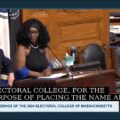The adoption by the City Council of BERDO, Mayor Fuller’s landmark sustainability legacy, is a major step toward reducing greenhouse gas emissions in Newton. It also changes how we think about energy use in buildings. It is more than an unavoidable expense; rather, long-term energy planning is now an integral part of building maintenance, like indoor air quality or good working and living conditions.
Among the 385 buildings covered by BERDO, responsible for 28% of all greenhouse gas emissions in Newton, 103 are multifamily centrally heated buildings, both condos and rentals. Their inclusion was highly controversial. The proponents put forth several arguments: they represent 20% of emissions from large buildings; as physical entities, multifamily buildings are no different from commercial buildings; the sooner the long term planning for energy upgrades begins, the lower their costs will be; compliance with emission targets does not begin until 2031, and electric heating technology gets better and cheaper every year. BERDO for multifamily will also engage Newton residents in seeing a direct connection between their private lives and greenhouse gas emissions in Newton, a connection that is invisible in people’s daily lives.
The opponents expressed concerns that BERDO would increase rents; and that it singles out Newton residents who live in large buildings while excluding small family houses (responsible for 33% of Newton emissions). In a final compromise, BERDO requires reporting by multifamily buildings but exempts them from compliance with emission targets. The plan is to revisit this exemption in a year and possibly amend the ordinance.
The inconvenient truth is that a meaningful reduction in greenhouse gas emissions is not and probably never will be free; and that effective policies require phased-in implementation, which produces temporary inequities in spreading the burden. While several estimates of potential costs put the expected increase in rents at approximately 4% or less, the actual empirical data are scarce. Enacting BERDO will stimulate building owners to close this knowledge gap by performing detailed analyses of the cost of building upgrades. As to the small residential houses in Newton: The Zoning and Planning Committee has already docketed a call for a conversation on that subject.
The fact is that a 3-4% rent increase will be too much for some residents. But the solution is not to give up on climate policies but rather to help the most vulnerable residents and businesses. Governments – federal, state and municipal – recognize it through the extensive system of incentives and subsidies. And BERDO has “hardship” and “alternative compliance” provisions for such cases as well as gradual and slow implementation schedule.
Regulating air emissions is a novel role for Newton. This is a complicated ordinance, which partly explains why it took more than three years to get to this final vote. It requires additional resources for writing regulations and for implementation. But BERDO is necessary for meeting the goals of the 2019 Newton Climate Action Plan and for doing our part for the state’s legal mandates on carbon emission reductions.
Halina S. Brown is Chair Emerita of the Newton Citizens Commission on Energy and Professor Emerita, Environmental Science and Policy Program at Clark University.






